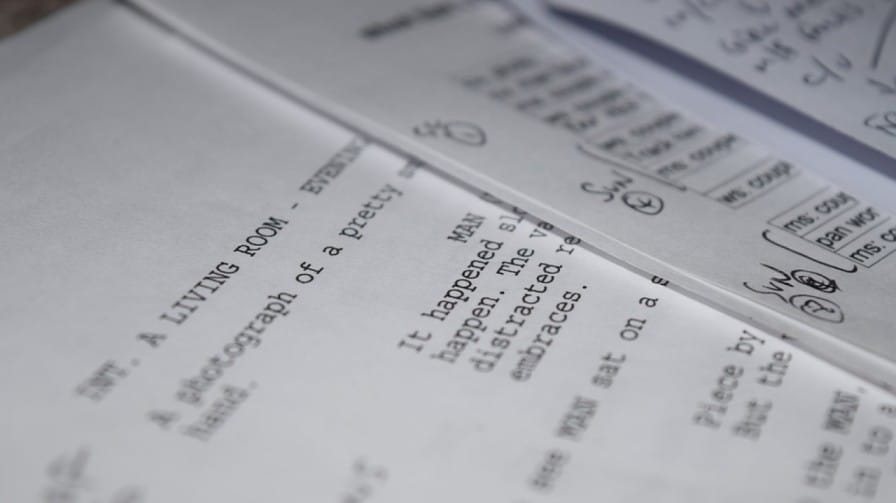Trying to hit a certain page count is probably one of the least exciting elements of writing and polishing a screenplay. But for those sitting down to read it, a screenplay’s page count can be hugely illustrative of what to expect.
Moreover, getting the screenplay page count wrong can be a major misstep for an amateur writer to make. So in this article, we take a look at why a screenplay’s page count matters and what can be done to make sure you’re hitting the right balance.
Table of Contents
Why Does a Screenplay’s Page Count Matter?
First and foremost, what is the generally accepted screenplay page count?
A feature film screenplay’s page count will traditionally be between 90 – 120 pages.
Why is this? Well, there is a generally understood rule that one page of a screenplay equates to one minute of screen time. And 90 to 120 minutes is the industry standard length for a feature film. Clearly, the rule isn’t infallible as a page full of action description will probably end up being much longer than a page of just dialogue. There is some flexibility. However, the rule serves as a guide and a relatively reliable one at that.
A screenplay page count that is just under or just over the 90 – 120 range is unlikely to send alarm bells ringing for those reading it. But a screenplay page count that is way under or way over will.
- A screenplay hitting somewhere around or between this generally accepted page count is a sign of a screenwriter who understands the professional industry standards.
- And in a contrast, a screenplay page count that’s way off the standard will make the prospective reader query the screenplay’s readiness.
This is particularly true of a writer who is just starting out. Quentin Tarantino, for example, can turn in screenplays that hit 140 or 150 pages and get away with it. But a newer, less tested writer won’t have the same leeway that a more established one will. And so hitting the industry standard screenplay page length is important in signalling your professionalism and the screenplay’s adeptness.

What Can a Screenplay’s Page Count Say?
A screenplay that is too short may make the film feel too slight or underdeveloped. Whilst a screenplay that is way over 120 pages will likely signal a piece of work that is bloated, un-edited and unstructured.
Of course, there are variations to this.
- Feature films often go over 120 minutes to say, 140 or even 160.
- At the opposite end of the scale, feature films can sometimes clock in at around 70 or 80 minutes but rarely much less.
A screenplay that is closer to 60 minutes is likely, particularly these days, to be considered to be more suitable for TV than film. The key beats of feature film screenwriting are unlikely to be covered in much less than 70 minutes, making the screenplay feel too light to really justify its presence as a feature in the first place.
The bottom line though is that if you’re going to go significantly above or below the standard screenplay page count, you better make sure you justify it. A screenplay reader will probably forget about the screenplay’s page count if you’re captivating them with a tight 70 pages or an expertly epic 140 pages. But first impressions count, particularly when you’re a relatively new screenwriter seeking to prove yourself.
Furthermore, screenplay page count can be very instructive as to the genre of the screenplay the reader is about to get into.
- A 120-page screenplay typically signals an action or thriller.
- Whereas a screenplay closer to 90 pages is more typical of a comedy or drama.
Of course, again, this can be flexible. But these are widely understood norms. If you’re going to deviate from these norms, you must seek to justify this with the strength of the writing and the cohesiveness of the idea you’re conveying.
Screenplay Page Count in TV

In TV writing, screenplay page count can differ depending on the format you’re writing for. TV shows typically break down into…
- 30-minute episodes (30 pages or slightly less) – typically a comedy or comedy-drama script.
- 60-minute episodes (60 pages or slightly less) – typically a drama or action script.
- Self-contained episodes (anywhere between circa 50 – 90 pages) – typically a limited series or stand-alone episode relatively unconnected to the episodes around it.
Historically, teleplays would have to had to adhere to strict broadcasting rules, accounting for tight slots, adverts and budgets. However, in the days of streaming, TV episode length is less strict and more fluid. Often series will have an episode that is 50 or so minutes followed by an episode that is 70 or even 80 minutes. It all depends on the series format.
However, particularly for writing a TV pilot, it’s best to be clear and coherent in your screenplay’s page count. Again, the length is all about conveying a confident idea and not one that has to be drastically edited or changed.
How to Trim or Extend Your Screenplay’s Page Count
So if you’re sitting in front of your screenplay and it’s running way below or above the standard page count, what can you do? Well, we’ve laid out 5 quick and easy fixes below. These can help you at least start to address the issues contributing to your screenplay’s imbalance.
1. Break Down the Script into Acts

Your screenplay should be fitting into an act structure, whether that’s a three-act or five-act structure. And if it’s not, an imbalanced page count can be a symptom. Your screenplay might, for example, not have enough breaks in pacing or shifts in tone and consequently run too short. Or you might be placing the inciting incident or climax way too late and be, therefore, elongating the script.
So try and break up your script into its acts. Then, tackle each one separately. This will help give you some space to see where the imbalances might be. Is one act significantly longer or shorter than the others? Do you even have discernible enough breaks to signify an act change?
As with page count, acts can be malleable. But likewise, a lack of broad structure will leave your screenplay and sense of authority as a writer vulnerable. If you’re pursuing an experimental structure you better make sure you justify it with tight control over that structure.
Whatever your route, separating your screenplay into act-based sections can help you see its parts with more clarity. Figuring each one out will, in turn, pave the way to putting them back together more smoothly.
2. Be Ruthless About Dialogue
Over-written dialogue can be one of the main culprits for making a screenplay page count too long. So it’s important you go through your screenplay and be sure that absolutely every line of dialogue in there is vital for telling the story.
You might even separate each scene and tackle each one on its own. This way, you’re less likely to get sucked into the flow of reading through the screenplay. You will, instead, be more focused on how every line of dialogue is necessary to the scene at hand. Again, sometimes taking the screenplay apart can be one way of seeing how it all pieces together more clearly.
Moreover, if you’re struggling to cut the dialogue down, one way of doing so is figuring out if the dialogue in question can be translated into action. If it can and serves to better convey what you’re seeking, then make the translation. This way, you both trim the dialogue and at the same time make your screenplay more visual and cinematic.
Dialogue doesn’t have to be sparse. It can be free-flowing and lengthy. But every piece of dialogue has to have a purpose for its inclusion. So be absolutely ruthless and microscopic about this process of exclusion. This way, you’ll likely find yourself with more room to breathe in terms of your page count.

3. Don’t Overwrite Description
A healthy screenplay should ideally have a good balance of action and dialogue. It might be a dialogue-heavy screenplay or an action-heavy screenplay. But the only way you make that feel like a choice is by making every piece of dialogue or action purposeful in its presence.
So in this light, your description must be careful and precise in its deployment. Not doing so can be a key reason for a screenplay going over the standard length. You might be overwriting the description and consequently interrupting the flow of the screenplay.
This isn’t a novel where you need to create an exact picture in the reader’s mind of how everything looks. A screenplay is a manual, a blueprint for others to launch from. That doesn’t mean your description can’t be evocative, beautifully written and even, for instance, take up several pages at once. But try and make your description efficient in what it’s conveying.
Is every piece of description vital to conveying the story? Have you gone a few sentences too far? Figuring out the answers to these questions can shave some pages off. But it can also help clarify the screenplay, making other potential issues easier to see and figure out.
4. But Don’t Undercook the Visuals
At the same time, you don’t want your visuals to be undercooked and for your screenplay to give a weak impression of how this story will look and feel on-screen. This might be a reason for your screenplay coming way under the required page count.
An experienced script reader, development executive, agent or producer will want to read a compelling vision of a potential on-screen story. And the visuals are obviously an important part of that. A screenplay with dialogue and only the most basic of visual descriptions will struggle to imprint on a reader.
So how do you find the balance of writing visually and not going overboard and basically just writing a novel with some dialogue and scene headings interspersed? It’s all about the efficiency of your writing. You must be clear on the purpose of your description overall, what you’re seeking to achieve with its presence in your screenplay and your writing in general. Once you have that figured out, you can get more specific, honing in on each sentence and making sure every one counts.
A confident, authoritative writer is one that understands the tools they’re wielding and consequently wields them when is necessary. If you can convey this, the page count won’t matter as much. Both your voice and the story you’re telling with it will convey to the reader that you mean the screenplay to be the length it is and make them invested regardless.

5. Listen to the Page Count and Go Back to the Source
Usually, an imbalanced screenplay page count is a symptom of a wider problem in the screenplay or even in your writing generally. Such are the structures and disciplines of writing a screenplay, if the page count is off it’s either a sign you’re missing the mark somewhere or you’re doing something rare and different.
Most writers would like to believe it is the latter. However, particularly when you’re starting out, it’s best practice to assume it’s the former. Listen to your screenplay’s page count and what it’s telling you. Treat it like a symptom, not a cause. Try to get to the source of the problem rather than just treating the symptom.
The best way to do this is not to focus on the minute details of the screenplay you have in front of you. Instead, go back to the beginning. Have a look at your notes before you started writing the screenplay. Go back to the initial ideas, characters, themes and inspirations. Take a step back in order to take a step forward.
Trying to get your screenplay’s page count right can feel like a trivial element of the writing process. However, take a holistic approach to your screenplay and ideally such seemingly trivial elements will fall into place without much second thought and crucially, without much time-consuming and exhaustive tweaking to be done.
– What did you think of this article? Share It, Like It, give it a rating, and let us know your thoughts in the comments box further down…
– Struggling with a script or book? Story analysis is what we do, all day, every day… check out our range of script coverage services for writers & filmmakers.
Get *ALL* our FREE Resources
Tackle the trickiest areas of screenwriting with our exclusive eBooks. Get all our FREE resources when you join 60,000 filmmakers on our mailing list!


Thanks for the great tips…
Great read…. Brovo